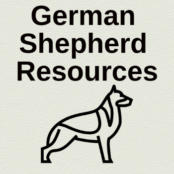
Welcoming a German Shepherd into your home is often synonymous with adding a loyal, loving friend to your family. Yet, even the most prepared owners can be taken aback by the powerful chewing habits these majestic dogs are known for. With their strong jaws and affinity for exploration, German Shepherds present unique challenges when it comes to managing chewing behavior. Here’s how to understand and address their natural instincts, ensuring a harmonious life for both you and your new canine companion. So are German Shepherds big chewers? It depends on the dog.
Table of Contents
The Nature of German Shepherds
German Shepherds, originally bred for herding and protecting flocks, are intelligent and active. This breed has a robust build and a keen intellect, making them ideal working dogs in various capacities, from military and police service to search and rescue. Their athleticism and versatility come with an equally intense need for mental and physical stimulation. However, their remarkable aptitude can lead to frustration and trouble if not channeled appropriately, especially in the realm of chewing. Add to that a GSD very strong bite pressure, long teeth, and a lot of damage can be done.
Understanding Dog Chewing
Chewing is an innate behavior for dogs. It serves several purposes—entertainment, dental health, exercise for the jaw, and relief from teething discomfort in puppies. In adulthood, chewing remains an essential outlet for mental and emotional well-being. For German Shepherds, the need to chew is amplified, making appropriate chew items indispensable.
Why Do German Shepherds Chew?
- Teething: Just like human babies, puppies go through a teething phase. Chewing helps alleviate the discomfort of incoming adult teeth.
- Boredom: If a dog is under-stimulated, especially in mental activity, chewing can become a pastime.
- Anxiety: Dogs may chew when they’re anxious or stressed, as a way of calming themselves.
- Play and Exploration: For young dogs, the world is a playground, and chewing is a way to learn about their environment.
The Inherent Chewing Intensity
Compared to some other breeds, German Shepherds indeed have a heightened proclivity for chewing. When not properly managed, their chewing habits can result in destruction of household items. Their chew behavior is also influenced by their temperament, which is often a mix of protectiveness, alertness, and eagerness to please, but with an underlying demand for guidance.
Comparing to Other Breeds
While generalizations about chewing can be made, it’s essential to recognize the individual nature of each dog. Some German Shepherds may exhibit milder chewing behaviors, while others may be more voracious chewers. This variance depends on factors like upbringing, socialization, and the dog’s unique personality. My 10 pound Pappillion has destroyed every bed I ever gave him! Jasper’s thing is paper. If it’s paper or cardboard, in Jasper’s estimation, it needs to be shredded!
Factors Impacting Chewing
- Age: Puppies naturally chew more than adult dogs due to the teething phase and their heightened need for exploration.
- Environment: A stimulating environment enriched with toys and activities can reduce the intensity of chewing.
- Training: Consistent training helps direct a dog’s chewing behavior towards acceptable outlets.
Managing Your Shepherd’s Chew Habit
Effective management of chewing in German Shepherds revolves around giving them the right guidance and diversion. Simply scolding them for chewing won’t suffice. Understanding why they chew and providing alternatives is key to success.
Providing the Right Environment
Encouraging a chewing environment that’s conducive to positive habits is crucial. Invest in a variety of chew toys—durable ones that are specifically designed for strong chewers. Rotate these toys to maintain novelty and interest. I like to provide raw cow femur bones for Jasper. Don’t give cooked bone though. They splinter. I buy these from an online grass-fed beef store, but your local butcher probably has them available. Bully sticks are another favorite but for a large dog like Jasper, they are cost prohibitive as he can eat one in 5 minutes!
Training and Positive Reinforcement
Redirect your Shepherd’s chewing to appropriate items. When they chew on their toys, praise them. Positive reinforcement teaches your dog which behaviors please you, leading to a happier household for both of you.
Exercise and Stimulation
Your German Shepherd needs both physical and mental exercise every day. Regular walks, playtime, and training activities help alleviate boredom, one of the major causes of destructive chewing. German Shepherds need exercise. Both physical and mental as in training. Don’t blame the dog for eating your couch if you are not giving him what he needs.
When to Seek Professional Help
Sometimes, despite your best efforts, a German Shepherd’s chewing behavior may persist at levels that indicate an underlying issue. This is when it’s time to call in the professionals—dog behaviorists, vets, or certified dog trainers can help diagnose the problem and suggest an appropriate solution.
Identifying Abnormal Chewing
If your dog’s chewing seems excessive even with proper management, it could be a sign of health problems or an advanced stage of anxiety that requires intervention. Inappropriate chewing, such as consuming objects rather than just gnawing on them, can be dangerous and needs immediate attention.
Health Considerations
Chewing unusual things can be a sign of anemia, dental issues, or nutritional deficiencies. A vet check-up is advisable to rule out these potential causes.
Engaging Professional Trainers
Enlist the aid of a qualified trainer if your German Shepherd exhibits problematic chewing. They can create a personalized training plan to address the behavior and provide ongoing support.
Conclusion and Final Advice
German Shepherds’ chewing tendencies reflect their innate needs and instincts. Recognizing these, accommodating them, and steering them towards appropriate outlets is an essential part of pet care. First-time owners should approach the process with patience and a commitment to learning about their new friend. With a blend of understanding, training, and potential professional guidance, the chewing habits of a German Shepherd can be managed effectively, leading to a fulfilling and lasting bond. Your German Shepherd’s chewing habits can be a challenge, but the rewards of their companionship and the mutual growth in the process are immeasurable.

